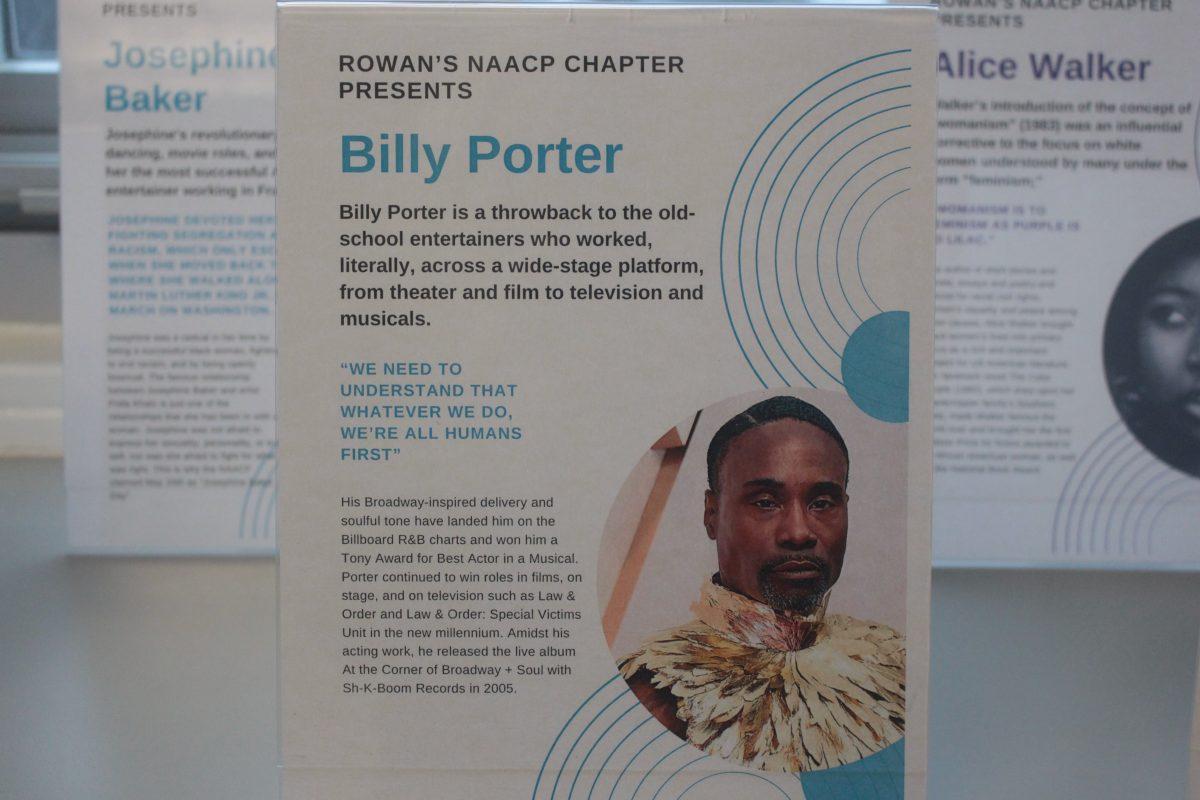This is part two of a two-part article. Check out part one here.
Black History Month shouldn’t be limited to February. It should just be a reminder to look back at the past and think about the present.
To focus on prominent black leaders throughout history and today, Prism collaborated with the Black Culture League club, Queer People of Color Collective and the NAACP chapter at Rowan to highlight 14 black LGBTQIA+ leaders. Each sign contains one leader with a description of their history and impact on the world.
The signs are located at the LGBTQIA+ Center at the Office of Social Justice, Inclusion and Conflict Resolution (SJICR), which is located in Hawthorn Hall.
Dr. Pauli Murray (1910-1985)

Dr. Pauli Murray was a black feminist who graduated Howard Law School first of her class. While studying, she participated in restaurant sit-ins as a way to desegregate public places. According to the sign at the LGBTQIA+ Center, Murray was “one of the first lawyers to argue that the Equal Protection Clause’s approach to racial discrimination should apply equally to gender-based discrimination.”
The NAACP, then led by Thurgood Marshall, used arguments from a law school seminar paper by Murray as part of the organization’s legal strategy in Brown v. Board of Education. Marshall later claimed that her book, “States’ Laws on Race and Color,” was “the Bible for civil rights lawyers.”
Murray became the first African-American female priest to be ordained by the Protestant Episcopal Church according to the Pauli Murray Project website.
Angela Davis (1944-present)

Angela Davis is an educator and activist who joined the Black Panthers, which was declared as a communist party by the FBI. Davis was the FBI’s most wanted criminal until she was acquitted in 1972. She continues to fight the judicial and prison system today, which tends to over-incarcerate people of color. Last year she won the Fred L. Shuttlesworth Human Rights Award from the Birmingham Civil Rights Institute.
Billy Porter (1969-present)

Billy Porter is known for his award-winning acting roles and his fabulous fashion. In 2013, Porter won the Tony Award for Best Actor in a Musical for his role as Lola in “Kinky Boots.” This year he was the first gay black man to win an Emmy for Lead Actor in a Drama Series for his part as Pray Tell on FX’s “Pose.”
For his new project, he will be playing as the Fairy Godmother or Fab G in the upcoming “Cinderella” remake. According to New York Post, Porter said the role is genderless because magic has no gender.
Bayard Rustin (1912-1987)

Bayard Rustin was an important leader during the Civil Rights Movement. He worked closely with Martin Luther King Jr. and helped organize the March on Washington. He strongly believed in nonviolent protests. In 1953, he was arrested in California for having consensual sex with men and he spent 50 days in jail. This year he is being posthumously pardoned for his conviction according to the Smithsonian.
Audre Lorde (1934-1992)

Audre Lorde described herself as “black, lesbian, mother, warrior, poet.” Throughout her life, Lorde used her poetry to address injustices of racism, sexism, classism and homophobia. According to the sign at the LGBTQIA+ Center, “Audre Lorde was the recipient of many honors and awards, including the Walt Whitman Citation of Merit, which conferred the mantle of New York State poet for 1991.” This award recognized her as the poet laureate of New York State.
Langston Hughes (1902-1967)

Langston Hughes was a poet, social activist, novelist, playwright and columnist. He was also part of the Harlem Renaissance, in which black intellectual, literary and artistic works came to life. According to the LGBTQIA+ Center’s sign, Hughes “sought to honestly portray the joys and hardships of working-class black lives, avoiding both sentimental idealization and negative stereotypes.” Some of his well-known poems include “I, Too” and “Theme for English B.”
For comments/questions about this story, email [email protected] or tweet @TheWhitOnline.
























































































































































!["Working with [Dr. Lynch] is always a learning experience for me. She is a treasure,” said Thomas. - Staff Writer / Kacie Scibilia](https://thewhitonline.com/wp-content/uploads/2025/04/choir-1-1200x694.jpg)









































